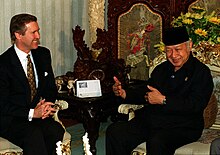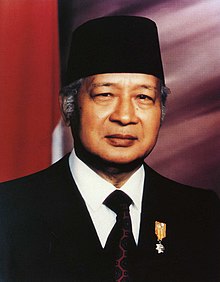At first, many saw Suharto as a comparatively obscure officer who had been fortuitously thrust to prominence by the events of late 1965 and assumed he would not remain in power long. However, by the early 1970s, he had consolidated his position by both isolating his rivals within the army and ruling elite and rewarding those loyal to him with patronage building the presidency into the most powerful institution in Indonesia. By the 1980s, Suharto dominated the New Order and his military contemporaries had retired or were otherwise no longer a threat to his position.
 |
| Suharto is appointed President of Indonesia at a ceremony, March 1968. |
Following the communal and political conflicts, economic collapse and social breakdown of the late-1950s and mid-1960s, Suharto's "New Order" (so-termed to distinguish it from Sukarno's "old order",began with much popular support from groups keen to be free of the troubles of the past. The new generation of young leaders and intellectual life was loosely termed the angkatan 66 ("generation of 66"), however, within a few years the New Order elite, centred around a military faction, had alienated many of its original supporters. While rightists admired the New Order for eradicating the PKI and for its pro-Western policies, leftists despised it for doing the same. The government received admiration for stabilising the economy, but received condemnation for corruption and its human rights record. In place of Sukarno's revolutionary rhetoric, Suharto showed a pragmatic use of power, and in contrast to the liberal parliamentary democracy of the 1950s, Suharto headed an authoritarian, military-dominated government.The "New Order" featured a weak civil society, the bureaucratisation and corporatisation of political and societal organisations, and selective but effective repression of opponents.
As part of 1967s 'Basic Policy for the Solution of the Chinese Problem' and other measures, all but one Chinese-language papers were closed, all Chinese religious expressions had to be confined to their homes, Chinese-language schools were phased out, Chinese script in public places was banned, and Chinese were encouraged to take on Indonesian-sounding names. Much of this legislation was revoked following Suharto's fall from power in 1998.
 |
| Suharto on a visit to West Germany in 1970. |
Economy
From 1965 to 68, hyper-inflation was brought under control. A group of American-educated economists, dubbed the 'Berkeley Mafia', were brought into restructure economic policy. Measures implemented to encourage foreign investment in Indonesia included the privatisation of natural resources, labour laws favourable to multinational corporations, and soliciting funds for development from institutions including the World Bank, western banks, and friendly governments. In a shift from policy under Sukarno, the New Order allowed USAID and other donor agencies to resume operations within the country.[citation needed] He opened Indonesia's economy by divesting state owned companies, and western nations were encouraged to invest in mining and construction activities.[citation needed] Within a few years, the Indonesian economy had been revived from its near collapsed state of the mid-1960s. It recorded strong annual economic growth for the three decades of Suharto's presidency although some of the gains were lost in the 1997/98 Asian financial crisis. Indonesia achieved self-sufficiency in rice production by the mid-1980s, basic education was provided to almost all citizens, and a successful family planning program was implemented. Subsidies on basics such as food and fuel to maintain grass-roots support were provided but were costly to the government budget.
Suharto's former government ministers flatly stated the alleged lowering of poverty rates was false. The Suharto regime's definition of poverty was also inflated: it was a monetary sum, a rupiah base sufficient to enable the poor to get the internationally accepted norm of 2,100 calories a day. The cash amount had been less than the globally accepted poverty line of $1 a day. Until the 1998 crisis, it was only about half that in Indonesia's cities, and less in the countryside.
Influence and business opportunity became increasingly concentrated within Suharto's family, relatives, favoured generals and a number of ethnic Chinese businessmen that he had known since his time in Semarang in particular Liem Siu Liong and Bob Hasan. Much of the funds flowed to foundations (yayasan) controlled by the Suharto family. By the late 1980s, the extent of the first family's business activities concerned even long-time military associates, such as General Benny Murdani. By the pre-financial crisis peak of the mid-1990s, the family's annual revenue was estimated in the billions of US dollars. Much of it was recycled back into pay-offs, patronage, military subsidies, and campaign funding.
Foreign policy, Irian Jaya, East Timor and Aceh
Upon assuming power, Suharto dispatched his foreign minister Adam Malik to mend strained relations with the United States, the United Nations, and end the Sukarno-instigated Konfrontasi with Malaysia. Previously increasingly close relations with China were cut (diplomatic ties were restored in 1990). Suharto played an important role in the establishment of the Association of Southeast Asian Nations (ASEAN) in 1967 and the Asia-Pacific Economic Cooperation (APEC) in the early 1990s. Officially, the "New Order" followed a foreign policy of neutrality.
 |
| Suharto attends 1970 meeting of the Non-Aligned Movement inLusaka. |
In 1976 Suharto authorised troops to put down the rebellion of the Free Aceh Movement, or GAM, who demanded independence for Aceh from Indonesia, forcing several of its leaders into exile in Sweden.[73] Prolonged fighting between GAM and the Indonesian military and police led Suharto to declare martial law in the province, by naming Aceh a "military operational area" in 1990.
 |
| Suharto with U.S. Secretary of Defense William Cohen, 14 January 1998. |
Politics and dissent
In 1970, corruption prompted student protests and an investigation by a government commission. Suharto responded by banning student protests, forcing the activists underground. Only token prosecution of the cases recommended by the commission was pursued. On 5 May 1980 a group of prominent military men, politicians, academics and students calling themselves the "Petition of Fifty" questioned Suharto's use of the national ideology Pancasila. The Indonesian media suppressed the news and the government placed restrictions on the signatories. After the group's 1984 accusation that Suharto was creating a one-party state, some of its leaders were jailed.[citation needed] In the same decade, it is believed by many scholars that the Indonesian military split between a nationalist "red and white faction" and an Islamist "green faction." As the 1980s closed, Suharto is said to have been forced to shift his alliances from the former to the latter, leading to the rise of Jusuf Habibie in the 1990s.
The New Order's economic achievements were a major foundation of support for Suharto across decades. Economic growth, however, was causing great social change which was in contrast to the rigid political system built around the President. Social dislocation in rural areas and the formation of a new working class around large industrial areas led to a sense of social inequalities jealousies from the late 1980s. At the same time, the fast growing and prospering middle class grew increasingly uneasy with corruption and looked for greater political participation. Key figures and factions within the ruling elite began to jockey ready for Presidential succession as Suharto entered his late 60s.
Following the end of the Cold War, Western concern over communism waned, and Suharto's human rights record came under greater international scrutiny. The 1991 killing of over 200 East Timorese civilians in Dili, East Timor, resulted in the Congress of the United States passing limitations on IMET assistance to the Indonesian military. In 1993, under President Bill Clinton, the U.S. delegation to the UN Human Rights Commission helped pass a resolution expressing deep concern over Indonesian human rights violations in East Timor.
By 1996, Megawati Sukarnoputri, the daughter of Sukarno, and chair of the Indonesian Democratic Party was increasingly critical of Suharto's "New Order". In response, Suharto backed a co-opted faction led by Deputy Speaker of Parliament Suryadi, which removed Megawati from the chair. A government crackdown on demonstrating Megawati supporters result in a number of deaths, rioting and the arrest of two-hundred. Those arrested were tried under the anti-Subversion and hate-spreading laws. It marked the beginning of a renewed crackdown by the New Order government against supporters of democracy, now called the "Reformasi" or Reformation.
Continue Read Part V



0 komentar:
Posting Komentar
Leave a comment